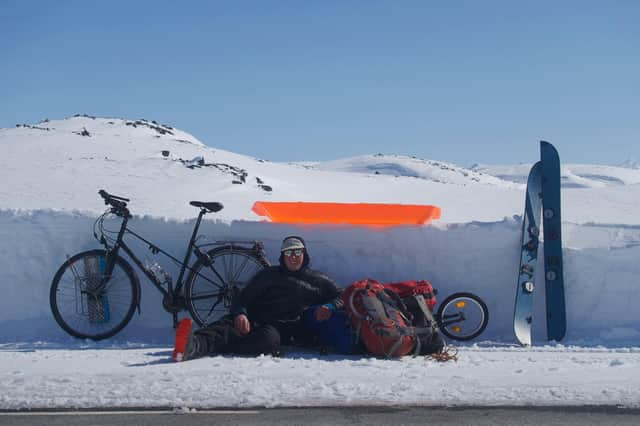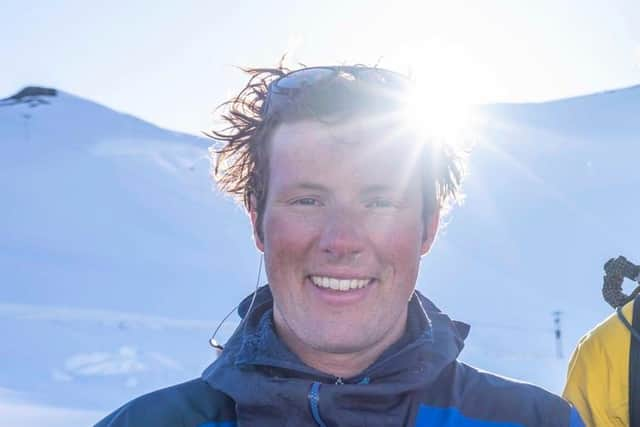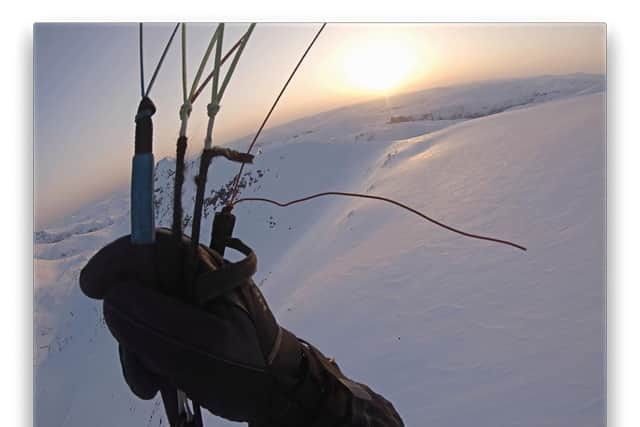Scottish Snowboarder’s 700km glacier adventure hits the big screen


In her excellent new book Time on Rock (full review to follow soon), in which the Edinburgh-based climber and writer Anna Fleming charts her development from struggling beginner to completer of Extremely Severe-graded routes, she makes a brief but very worthwhile digression to consider the term “epic”. In the climbing world, she explains, an epic “refers to a particular type of experience... a climb that was long, hard and problematic for any number of reasons.” When she began her climbing journey, she recalls, “the first climbers that I came into contact with were young men who delighted in recounting epic stories; but their ale-fuelled outpourings of heroic masculinity did not enrapture their entire audience.” Later, however, she discovered that not all epic tales have to be told in this way: “Older climbers tend to deliver their stories more quietly – with twinkling eyes and sardonic finesse.”
This dichotomy isn’t unique to climbing – it can be observed in other mountain sports such as skiing, snowboarding and mountain biking. Within all these allied and often overlapping worlds, there are those, usually younger, who recount the details of their misadventures as if they are still buzzing from the experience (“man, that was epic!”) and there are those, usually older, who offer them up more as cautionary tales (“ooft, yeah, that was a bit of an epic.”) Which brings us to the programmes of mountain film festivals, where both approaches to storytelling tend to be on display.
Advertisement
Hide AdAdvertisement
Hide AdSadly, this winter’s Edinburgh and Dundee Mountain Film Festivals have both fallen victim to coronavirus restrictions but the Fort William Mountain Festival, which may not have the word “film” in its title but still has a significant film strand, is scheduled to go ahead from 16-20 February. Inevitably, some of the films in its programme will take a more youthful approach to telling epic stories, while others will go down the cautionary tale route. And then there will be those, like An Ode to the Glacier by Calum Morris Macintyre, which incorporate a bit of both.


Morris Macintyre is a Scottish snowboarder, now resident in Norway, and his film charts a remarkable 700km solo journey he made around Jostedalsbreen, the largest glacier in continental Europe. To begin with, he’s on a bike, dodging cars and campervans on the main road while towing a split snowboard and paragliding equipment behind him on a trailer. Once the road runs out, however, he uses his splitboard to skin across the snow and ice of Jostedalsbreen, towing the rest of his gear behind him on a pulk – a lightweight plastic sledge.
In every sense, it’s a trip of ups and downs: as he says in the film’s introductory sequence, “I wanted to experience the lows and the highs of travelling through a landscape I knew well in a different way [but] like any great adventure, things did not go as planned.”
The ups include snowboarding through chest-deep powder snow and paragliding high above the glacier at sunset, and thanks to the magic of GoPro cameras, Morris Macintyre is able to capture all this in stunning high-definition without hauling lots of heavy camera gear around. As in any good epic though, the downs are where much of the interest lies.
The first major challenge he faces is a snowstorm so heavy that it causes his tent to collapse and tear. Fortunately this happens when he is within striking distance of a friend’s house, so he is able to stay there and order a replacement tent online.


His reaction to the death of his tent is admirably relaxed: “The tent is totally destroyed – and it’s snowing HARD now, too... which could be quite good for the next few days, actually, for [snowboarding], but for my situation right now it’s kinda bad.”
The second serious setback he faces, however, is infinitely more frustrating. When he first transfers his bike and all his camping gear into the pulk and begins hauling it across the glacier, he discovers that the load is too top-heavy and the pulk keeps tipping over onto its side. Various attempts to rectify the situation fail, so in the end he has to hike to his intended campsite twice, once towing half his gear, then a second time carrying his bike.
It would have been easy enough for Morris Macintyre to edit the film in such a way that he seemed to take all this effortlessly in his stride; it’s very much to his credit however, that he leaves in footage of him first in a state of almost speechless frustration, when he realises how much harder his journey has just become, and then in a state of complete exhaustion when he is finally able to crawl into his tent.
Advertisement
Hide AdAdvertisement
Hide Ad“That was a long and really horrible day,” he tells the steamed-up camera, before noting wryly that all he has left to eat is powdered hot chocolate. If at times there are perhaps traces of what Anna Fleming might call “heroic masculinity” in An Ode to the Glacier, then, these are nicely counterbalanced by such moments of “sardonic finesse.”
An Ode to the Glacier is screening as part of the Fort William Mountain Festival, which runs from 16-20 February with a launch night on 16 February, see www.mountainfestival.co.uk
A message from the Editor
Thank you for reading this article. We're more reliant on your support than ever as the shift in consumer habits brought about by coronavirus impacts our advertisers.
If you haven't already, please consider supporting our trusted, fact-checked journalism by taking out a digital subscription at https://www.scotsman.com/subscriptions
